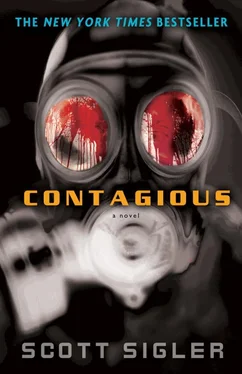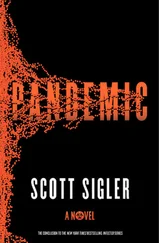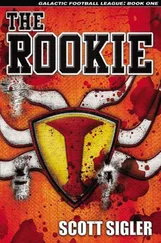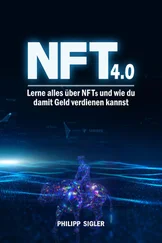Perry aimed and fired.
The bullet hit the last man dead center in the forehead. He took one step back, dropped his gun, then lifted his right hand, weakly, as if he wanted to touch Chelsea’s hair one last time.
The man fell backward.
He didn’t move.
Perry looked at Chelsea. So beautiful. He understood that man’s dying gesture of love, of affection.
Why would you kill me, Perry?
Hate tinged her ice-cold eyes.
Cold, like the eyes of a hatchling.
You’re not like anyone else. I can see into your memories, Perry. No one accepted you for who you are, but with me you can be what you were born to be—a killer.
“Maybe that’s what I was born to be,” Perry said. “But it’s not who I am anymore.”
It is, and you know it is. Why help them? What have these people ever done for you?
“One of them was going to take me fishing,” Perry said.
Then he shot Chelsea Jewell in the face.
A soldier handed Margaret a satphone. She just looked at it. Clarence took it and answered.
“Agent Otto here.”
The voice on the satphone was crackling but clearly audible. “It’s Murray. I’ve got Perry. He wants to talk with Margaret.”
Margaret’s body sagged in her seat. Perry was still alive? Not for long, not long at all.
“Okay,” she said, and took the phone.
More crackling, then the deep voice of Perry Dawsey. “Hey Margo.”
She fought back the tears. If she cried too hard she couldn’t speak. “Hey,” she said. “Are you… are you on Dew’s phone?”
“Yeah,” Perry said. “I got Chelsea. The voices have finally stopped, but… I don’t think I’m doing so good. I’ve got those things inside me. It hurts. Bad. I think they’re moving to my brain. Margaret, I don’t want to lose control again.
“You won’t,” she said. “They won’t have time.”
A pause. “Holy shit,” he said. “Are you nuking me?”
“Yes.”
Laughter, cut short by a wet cough, then a groan of pain. “Dew said I’m like a cockroach, that nothing can kill me. I don’t think physics is on my side this time, though.”
Margaret let out a sound that was half cry, half laugh. Her soul hurt.
“Clarence with you?”
“I can hear you,” Clarence said, his voice also choked with sobs. “You are really something else. Nobody ever been as tough as you.”
“Sorry about those Toby jokes,” Perry said. “Truth be told, I was just jealous of you and Margo. I wanted to beat the shit out of something, and you were there.”
“I know,” Clarence said. “It’s nothing.”
“Don’t fuck it up with her,” Perry said. “I hope you know what you’ve got.”
“I do,” Clarence said. “Trust me, I do.”
“Cool,” Perry said. “Uh… how long do I have?”
Murray’s voice. “About fifteen seconds.”
“No shit?” Perry said. “That’s kind of fucked up.”
A pause. More coughing.
“Margo?”
“Yes?”
“Thank you for saving my life.”
The order came through.
Captain Paul Ward asked them to repeat it.
They did.
Paul said nothing.
His weapons officer, Lieutenant Colonel Maegan “Mae” Breakall, sat right behind him. She was one the few female crew members of an F-15E, and she’d achieved that position by being a team player and never questioning an order.
While Paul sat speechless, Mae also asked them to repeat it.
They did so, this time with a bit more force.
Captain Paul Ward then did something he hadn’t done in his entire military career—he refused to obey.
No sir.
No sir, I will not drop a ten-kiloton B61 nuclear warhead on the Motor City.
Fifteen seconds later, air force general Luis Monroe came on the line. As if that weren’t enough, President John Gutierrez joined in as well. One hell of a conference call.
Monroe explained, quite calmly, considering the situation, that if Paul and Mae disobeyed a direct order, it was an act of treason. Gutierrez added some motivation of his own—if Captain Paul Ward did not drop the bomb, like right fucking now, he would be directly responsible for a disease spreading across the United States of America, a disease that could potentially destroy the country, its people, and if they were really unlucky, the entire human race.
Paul and Mae had no idea how much of this was true, but then again, it wasn’t their job to question orders. Their job was to follow orders, from any commanding officer—and when those orders came first-person from the air force’s top man and the commander in chief, it was impossible to disobey.
Paul pulled back on the yoke, bringing the F-15E to fifteen thousand feet. As he did, the rest of his squadron kicked in the afterburners and headed out. The radio filled with chatter: the Ospreys, Black Hawks, A-10s, F-15s and every other aircraft turned away from downtown Detroit and flew at maximum speed.
Paul and Mae were alone.
About to drop a nuke on America.
Mae fought back tears as she entered information into the computer.
A B61 Model 4 tactical nuclear warhead is a kiloton-range weapon with a “dial-a-yield” feature. Dial-a-yield allows aircraft crews to change the B61’s output while in midflight. As ordered, Mae set in a yield of ten kilotons. She set the detonation point at one thousand feet, armed the weapon, then told Paul that it was ready to fire.
He flipped open the covering plate on the nuke trigger. He thought of his three sons back at Mountain Home Air Force Base in Idaho, wondered how many sons like them were down there in Detroit, how many daughters, mothers, fathers, brothers, sisters, nephews, nieces and cousins. And dogs. How many dogs were down there?
His finger gripped the trigger. His hand felt weak. He hoped that maybe, just maybe, he’d have an unexpected stroke and lose the ability to squeeze it.
Mae said, “Do it, Paul.”
He squeezed.
He didn’t have a stroke.
The trigger clicked home.
The twelve-foot-long B61 rocket fired, launching away from the F-15E at 750 miles per hour. As the bomb streaked toward the target, Paul went full throttle and shot away from Detroit at supersonic speed.
The seven-hundred-pound B61 dropped toward the city. The guidance computer tracked a signal emitting from near the corner of Franklin and Riopelle. The B61 wouldn’t actually hit the ground, but if it had, it would have landed only twenty feet away from the satphone in Perry Dawsey’s hand.
At twelve hundred feet, a gas generator fired, ejecting a twenty-four-foot nylon/Kevlar-29 ribbon parachute. In just three seconds, the B61 slowed from 750 miles an hour to 35.
It drifted down until it hit eleven hundred feet, where barometric pressure activated a firing mechanism that began a nuclear chain reaction.
Detonation.
In a millionth of a second, a fireball formed and heated the air to 18,000,000 degrees Fahrenheit, nearly twice as hot as the surface of the sun. This heat radiated outward at the speed of light, expanding and dissipating. Dissipating being a relative term, however, as the heat caused instant first-degree burns as far as two miles away. The closer to the detonation, the worse the burns. Inside a quarter mile of the blast, flesh simply vaporized.
Every spore within a mile of the detonation point died instantly. Those between one and two miles out lived for as long as two seconds before they burned up in infinitesimally small puffs of smoke. The five-mile-per-hour wind had carried some lucky spores as far as two and a half miles away—those took almost five seconds to cook, but they cooked just the same.
Читать дальше












